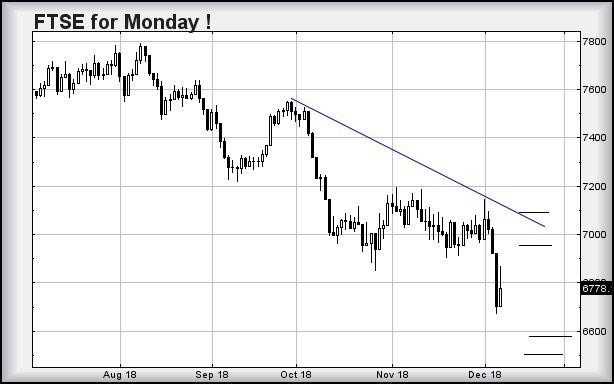Any form of media outlet in the UK when writing about financial markets, currency or growth outlook is predicting post-Brexit, the UK will fall into the abyss. This has created a sentiment of uncertainty and panic. As a result, there are likely to be some “short” opportunities for the FTSE index, along with sterling too.

While we better caveat anything we state with financial markets rarely doing ” the obvious”, commentators have been expecting parity for sterling for ages and a bottom of 6,640 on the FTSE 100. Last week, the bottom went to 6670 points, near enough a support level.
It typical in a falling market like this investors “sell on the rumour” and prefer to buy on the fact.” This is one sign of a pending bear market and certainly a dip. Usually, the exact opposite is true, with investors buying on the rumour and selling on the facts and certainty.
Rumour of Prime Minister resignations, no more renegotiations possible have fuelled “Project Fear” defined as a deliberate campaign to sew terror ahead of Brexit. If this sentiment continues, weakness below 6,670 driving the FTSE down to 6,580 next. If broken, the secondary is at 6,502 where some sort of bounce is expected.
However, if China/US trade wars cool (which seems to happen), Italian debt concerns get put on the back burner and Brexit seems to drag its heels forward above 6,884 points will give an early indication the recent visit to 6,670 is the bottom. From there a jump up and moves to a “Santa rally” could happen with movement to 6,957 and possibly 7,094 points if better.
Adios for bull markets?
Last week was yet again another poor week for stock markets around the globe. For the pound (£), its value dropped at one point to worth $1.25 although it cooled off in the latter part of the week as US interest rate hike plans seem to be being re-evaluated, to say the least. When there is rarely good news, or in this week’s case, not more bad news, like the recent easing of tensions between China and America after President Trump’s meeting with Xi Jinping, financial markets temporarily react positively, but without sustained momentum, they soon sell off again.
Moving on from the FTSE, the Dow Jones Industrial Average fell 4.5% last week, closing below 24,400 coincidently that’s 9.5% lower than it was when it peaked at the start of October. Moving around Europe, the German Dax lost 4.2%, the French CAC 40 fell 3.8% and further afield in Asia, the Japanese Nikkei 225 was down 3.0% over the week. The Shanghai Composite was one of the few stock market indices to go up last week (linked with the trade war cooling), gaining 0.7%, however, currently 20% below where it started the year.
What does a weak Sterling mean currently mean for FTSE companies?
It’s been widely accepted that Sterling and currency across these markets is a very strong indicator of how that economy is performing. For the UK, Sterling has been hit post-Brexit referendum and been ranging from 1.11 – 1.15 against the Euro. At the moment it’s at the bottom of the range as UK MPs hosted a vote of no confidence in Teresa May which she, relatively speaking won with ease. It’s hard to sell that to yourself or party as a “Victory”.
The FTSE 100 and UK indexes usually react well with a Sterling drop as 70% of the companies listed on the FTSE take and report profits in US dollars, so as their worth and assets is now worth more due to a weakened pound, their overall valuations (albeit in the short term) is deemed more attractive and valuable. It has dropped below 6,800 and is back down where it was during 2014–2015 showing more signs of a recession and goodbye to the Bull market 10-year run.
For Sterling/Dollar, support at 1.27 was breached and it fell sharply to 1.25 as Parliament self-destructed and infighting became public knowledge and subject to vote. The same happened for the Euro as the Pound slipped just into 1.10 territory but strong support is found at 1.11 with a relatively strong ceiling and resistance is at 1.15. It will take some strong and stable good news to break out of the current climate.
